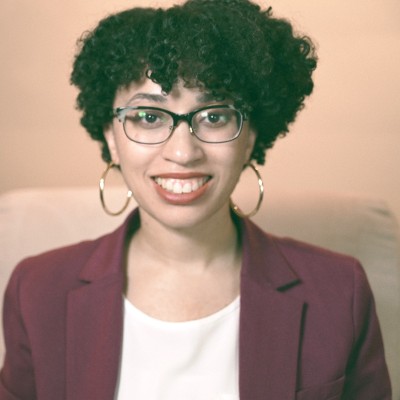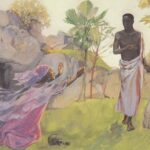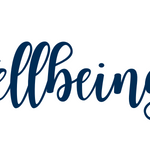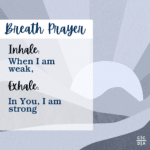While sabbath was not something I had previously heard much about, I felt God inviting me into practicing sabbath as I deepened my relationship with Him in 2020. Now, a big part of my work is to create sabbath spaces for other people and support people in developing their own sabbath rhythm through workshops, retreats, and church planting. It’s also central to the budding neighborhood church expression I’m planting in my hometown, Indianapolis, IN. I like author and pastor John Mark Comer’s framing of sabbath as incorporating communion with God, delight, loving community, and rest.
A Testimony of Sabbath Practice
God’s first invitation to me in 2020 was to not do any work for a full day. As I was working on finishing my Ph.D., that was a sharp departure from the norms of Ph.D. life. I was quickly humbled to realize that, like some of the Israelites in the wilderness who first got the sabbath instructions (Exodus 16:21-30), I could not follow God’s directions! Those emails had to be seen! That’s when I realized I had a disordered relationship with work, and I needed to humble myself. That was the beginning of a journey of cultivating sabbath rhythms.
Through prayerful discernment and listening, I learned to imperfectly recognize the sabbath rhythms God had for me. Rhythms included moments of focusing on God through reading scripture, praying, and meditating on His presence during the day. It also included doing a full 24-hour sabbath day at least once a week. Through these experiences, I realized God was changing me.
Accepting the invitation to sabbath allowed me to posture myself to receive from God rather than earning His blessings. I was able to know more deeply that God loves me for who I am as His precious daughter, and not what I do. I also experienced His grace in new ways when I believed He’s the center of the universe, and not me. He’ll still get things done when I’m resting. Burdens were released as I was able to accept these truths.
God healed me from traumas and wounds. My time being still was a major part of my formative journey, making me more into the person He created me to be. I saw His miracles at work in my life when I took a break from trying to make things happen myself. Most importantly, I learned to listen to God and developed an intimate relationship with Him.
Sabbath in Community
As I am building a budding neighborhood community of faith called The Gathering, creating sabbath spaces has been central to my approach. A small group of us get together once every other week to engage in contemplative practices that attend to God’s loving presence and allow us to listen to God and reflect together. It is a time for us to slow down and deepen our relationship with God and one another.
As I cultivate sabbath spaces for people, I consider shaping them with a balance of individual and communal activity, movement and stillness, and opportunities to hear from God in silence and to share our voices. I’m often led to pare down my initial agendas as I design sessions. Sessions tend to center various types of reflection, testimony, and contemplative prayer practices at a gentle pace. My workshops become less about information-sharing and more about experiencing God and one another.
What is the Fruit?
In the communal sabbath spaces, there is an atmosphere of gentleness and peace, even when discussing heavy topics. As participants experience insights from being still and listening for God’s “still small voice” (1 Kings 19:12)–or the “sheer silence” in NRSV– the revelations and invitations they hear often are meaningful to them, and they carry them forward. As a group, our ability to listen deeply to one another with gentleness shines through in these communal sabbath times. The experience fosters a community connectedness. It is a time of encouragement, clarity, and peace together.
The more people experience sabbath moments, the more they desire sabbath moments. I see people recognize why these slowed-down moments matter in their lives, and they develop a commitment to intentionally practice sabbath times in their lives. There’s no going back!
God’s Up to Something
I’ve been seeing more people and communities talking about and exploring sabbath practices over the last few years across diverse facets of the Church, and an awareness of health and wellness has blown up in society. I believe God is inviting us into more rest as a broader community. Sabbathing prepares us to receive. Practicing sabbath can help posture communities to receive an outpouring of God’s Spirit and prepare us to engage in the good works He calls us to for “such a time as this” (Esther 4:14).
Find Your Rhythm
I encourage you to ask God how you can support the community you serve to engage in sabbath rhythms. Take time to listen, reflect, and journal with others about this. Moreover, I encourage you, as practitioners, to commit or recommit to moments of rest, delight, community, and communion with God in your sabbath rhythms for this season. Identify contemplative practices that can support your process of stillness with God. John Mark Comer, Barbara Peacock, and Peter Scazzero have resources that have been meaningful for my practice.
A Prayer for us
Creator God, we thank You that You rested on the seventh day and showed us that, as reflections of You, we too can rest. You have invited us into Your rest, Jesus, and we are grateful. Guide us to lay down our burdens at Your feet and take time to rest without guilt or shame. Give us the freedom to have experiences of rest and to support others in their experiences of sabbath rest. We thank You, God! Amen.

About Dr. Courtnye Lloyd
Dr. Courtnye Lloyd is a community-builder, retreat leader, and pastor with a heart for cultivating communal experiences to support people in deepening their relationship with God. She is passionate about rest and sabbath and has a heart for various expressions of worship. She’s been influenced by her experience in African American Presbyterian and Baptist churches, and Vineyard and non-denominational church communities.
Courtnye has worked as a consultant with the Lilly Endowment’s Clergy Renewal program and taught at Brandeis University and Boston College. She has led workshops for the Wabash Pastoral Leadership Development Program and Christian Community Development Association. Dr. Lloyd previously worked in workforce development, youth development, and education.
She holds a Ph.D. in Applied Developmental Psychology and Education from Boston College, a M.Ed. in Education Policy and Management from Harvard University and a B.A. in Psychology from Duke University. She will be completing her M.A. in Divinity from Shaw University in the spring of 2025.





